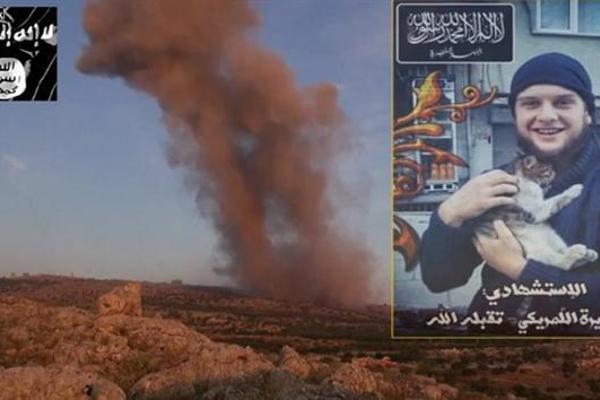Turkey lists al-Nusra Front as terrorist organization
ISTANBUL


An image grab taken from a video released by jihadist group Al-Nusra Front and uploaded on LiveLeak on May 30, 2014 allegedly shows a portrait of American citizen Moner Mohammad Abu-Salha, who is believed to have been involved in the suicide bombing against regime forces in Syria's northern province of Idlib on May 25, 2014, and smoke rising in the background which allegedly shows the scene moments after the attack. AFP PHOTO / LIVELEAK
Turkey has listed the al-Nusra Front, a branch of al-Qaeda operating in Syria and Lebanon, as a terrorist organization, in a sign that Ankara’s concerns are growing over the rise of radicals across the 900-kilometer border.Al-Nusra was listed as a terrorist organization by the United States in December 2012. Several other countries, such as Australia and the United Kingdom, as well as the United Nations, also recognize it as a terrorist organization. Although other jihadist groups fighting in Syria’s civil war claim to be inspired by al-Qaeda, the al-Nusra Front is the only one to be officially sanctioned by the group’s leader, Ayman al-Zawahiri. Rights groups have accused the al-Nusra Front of committing war crimes against civilians in Syria, including executions and hostage taking.
Al-Nusra was put on the list of “organizations that are affiliated with al-Qaeda” with an update made yesterday to an appendix of a Cabinet motion originally published in the Official Gazette on Sept. 30, 2013, involving the freezing of assets of individuals and organizations listed by the United Nations Security Council.
In another update, Indonesia’s Agus Dwikarna, a member of Jemaah Islamiyah and a facilitator for al-Qaeda in Indonesia, has been added to the list of “individuals who are affiliated with al-Qaeda” in the Official Gazette.
Objections can be made to the Council of State against the motion within 60 days by referring to Article 5 of the Turkish Law to Prevent the Financing of Terrorism.
Ankara has long championed robust support for Syria’s fragmented opposition, but the growing influence of al-Qaeda-affiliated groups in the war-torn country has left it open to accusations that it is backing radical Islamists.
A lawmaker from the main opposition Republican People’s Party (CHP), Aykan Erdemir, criticized the decision and said the government was late to take action. “It takes 861 days for the government to recognize the al-Nusra Front as a terrorist organization,” he said in a written statement, referring to the establishment date of the militant organization.
Still, thousands of European jihadists were recently blacklisted by Ankara, and Foreign Minister Ahmet Davutoğlu vowed last month no tolerance for the groups, noting that Turkey has also suffered from their activities.
“The claims of our country’s support for organizations in the region, that it has turned a blind eye to activities of these [organizations] and that al-Qaeda and al-Nusra militants have the right to freely move within Turkey by no means reflect the truth,” Davutoğlu said in an official statement issued in response to several motions filed by opposition lawmakers.
“Intelligence and preventive measures aimed at the activities of the said elements are being taken by our related institutions. Turkey is a country that has suffered from al-Qaeda attacks in the past. Within the framework of U.N. Security Council resolutions, our country is also sensitively fulfilling its liabilities concerning al-Qaeda and persons and groups affiliated with al-Qaeda,” Davutoğlu said at the time.
Last year in November, Prime Minister Recep Tayyip Erdoğan also vowed no tolerance for al-Qaeda-linked groups and said it was out of question for Turkey to provide shelter for them.
On May 11, 2013, twin bombs killed 53 people in the border town of Reyhanlı in Hatay. Authorities have insisted suspects being tried for the attack are linked to Syrian President Bashar al-Assad, not Islamist rebels, but several leaked documents have cast doubt on the government’s claims, suggesting that al-Qaeda-linked groups committed the attack.
The Islamic State in Iraq and Levant (ISIL), another al-Qaeda offshoot, has also become a threat to Turkey in recent times, while also fighting against al-Nusra in Syria. Despite sharing an ideology, the al-Nusra Front is considered to be a less radical force than the ISIL.
